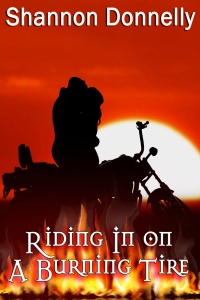 I’ve been watching a lot of movies about family lately, and some about family which don’t really seem to be about family, but really are. As in The Avengers, which is all about family.
I’ve been watching a lot of movies about family lately, and some about family which don’t really seem to be about family, but really are. As in The Avengers, which is all about family.
What!—you say. But that’s an action movie! Yes, it is. However, at its heart, it’s all about family. My favorite kind of family, in fact—the kind that bickers, fights, argues, tears itself apart, but which bonds together against any outside threat. (That was also me and my brother when we were growing up, which is probably why I’m so fond of that kind of family.) Critics have already noted the dysfunctional side of The Avengers—and other Joss Whedon shows, which is why I love Joss. I relate to dysfunctional. That also makes for the best kinds of stories.
Family is an important part of Riding in on a Burning Tire, the second book in the Mackenzie Solomon Demons & Warders series–a big part of the book is Mackenzie’s family showing up (and they don’t know she’s a demon hunter), and the trouble her little brother has gotten into. She’s already lost one brother–and it looks like she may lose a second to the “Rapturists”, folks out to end this world (for a better one, they think, but Mackenzie knows better).
Family, in a novel, gives you some of the best conflict and story ever. When in doubt, bring in the family. Yes, there are a lot of “orphan” stories out there, but you’ll notice the orphan doesn’t stay on her own for long. Soon, the family of choice shows up. That’s the great thing about family—they don’t have to be tied to you by blood. They can be tied by preference, circumstance, or just because you happen to see the world from a similar outsider view.
Readers and writers are all family—we bicker, fight, tear at each other. But we’re also bonded. We love our books, our stories—we love talking about them, pushing the best ones onto each other, gasping when other readers don’t love our favorites with the same insane passion. We bond over books. We’re every bit as dysfunctional as The Avengers—well, maybe not quite that super-powered, but close (including the costumes hanging in the closets). That shared love is one of the great joys of life—and all writers are readers. Books bond us. We love words and stories and characters. We read because life would be flat and unbearable without that escape. Stories make sense of our lives. And that’s why we write—because we want to share even more and so we dive into the deep end on things.
So, readers, next time you’re about to savage a book with harsh criticism, remember, that’s your sister in words who wrote that, and your brother, so put in some humor and respect—okay, maybe you don’t use that with blood kin, either, but this is your ink kin we’re talking about. Go ahead and hit hard—then, like that great fight scene in The Avengers, or even in Riding in on a Burning Tire (and boy is that gutsy to put my book in there with Joss’ work), after knocking each other around, offer a hand up and know that while you may come to blows occasionally (just to test each other and prove who really can dish it out), we’re all a family of readers out here. You may not like everyone in your family, but they understand you like no one else in this world.
RIDING IN ON A BURNING TIRE
A demon hunter about to lose her license…
Mackenzie Solomon is on the edge of going “dark” and losing her warder license if she gets any more evil on her. However, she’s also the only one who can stop an early Armageddon. And nothing has stopped the bad ideas… or the itch for action. That’s starting to cause a rift with her former charming partner, Josh. He’s been tainted by demon blood, so is he now one of the bad things she now needs to avoid? Because Josh may be responsible for the Endowment’s Magi going “Houdini” on everyone.
A charmer who can’t remember if he’s good or not…
With Josh going rogue to find out what he’s been charmed not to remember, Mackenzie is given a choice by the Endowment—bring him in and maybe the Magi will help them both. She’s not sure she trusts the offer—and she’s not sure she can trust Josh.
But it’s not demons or the undead that are her main worry. “Rapturists,” led by the charismatic and supernaturally seductive Isra Gilz, are out to take down the Endowment and kick-off the end of days. With tainted tats Isra has turned Mackenzie’s younger brother into his inside man on this plan—and Mackenzie may have to take them both out to stop Armageddon.
Redemption comes with a price…
Caught in her usual spot between good and evil, and needing to help her family or do her job, Mackenzie has tough choices to make. She just wants ones that don’t end with everyone dead—or herself forever damned. But saving the world is going to cost. She just has to make sure the price isn’t the life of the man who keeps her from the destructive darkness that’s always calling her name.


